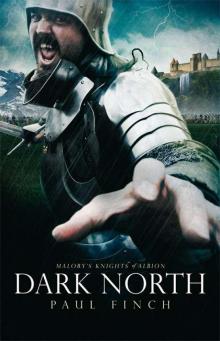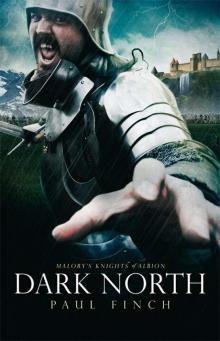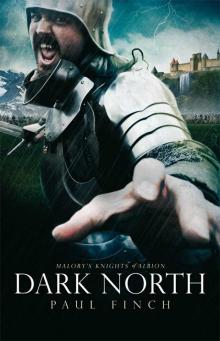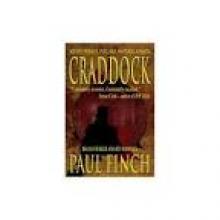- Home
- Paul Finch
Dark North (Malory's Knights of Albion) Page 6
Dark North (Malory's Knights of Albion) Read online
Page 6
“Not before time, Lucan,” Kay said gruffly. “The Romans are already here.”
“Do they measure up to their reputation?” Lucan asked, dismounting.
“They’re a bunch of wily old birds. You can tell that just from looking at them... great Heaven!” Kay peered more closely at him. “Are you unwell?”
“It’s nothing,” Lucan replied.
Kay shrugged. “A good thing you’re finally here. The King has called a pre-Council meeting. We are to attend him in the West Library.”
Lucan nodded, and he and his band were admitted to the fortress’s reception courtyard. Their animals were taken for stable and feed, and Lucan’s retainers sent to one of the great lodge-halls, where, by the light of a few smoky torches, each man would have a pile of straw on which to lay his bed-roll.
“The joys of Camelot,” Malvolio remarked as they viewed the gloomy cavern. “In the future, men will write about this magical place and no-one will believe it could be true.”
“When we’ve achieved rank, Mal, we can rest our bones between silken sheets,” Alaric said. “Hardships like this will keep us in the trim.”
“Of course,” Malvolio replied. “Stale air and a cold floor is just the thing to improve a body’s reflexes.”
Meanwhile, Lucan and Trelawna were conducted to a more comfortable apartment, high in the West Tower, comprising a broad central room, its whitewashed walls lined with woven cloths, with rugs covering the paved floor and a large fire crackling on a hearth. A divan sat in front of the hearth, alongside a table arrayed with sweetmeats, a jug of water, a pitcher of wine and two crystal goblets. The room was airy and lit by candles fixed in iron racks. There were two other rooms: a small privy and a sleeping chamber containing an immense four-posted bed, its mattress, pillows and quilt stuffed with duck-down.
Aching and begrimed from the journey, they sought first to bathe. A porcelain tub was on hand for the countess, which her ladies immediately set about filling. Once they had withdrawn, Lucan watched from the doorway as his wife relaxed into the steaming, scented water. Her tresses drifted on the surface in a golden froth, mingling with the floating petals of many exotic flowers.
She seemed barely aware of him as she rubbed her hands, arms, shoulders, and the pink tips of her breasts with a new creamy lotion from the Orient.
It occurred to Lucan that, should they go to war with New Rome, these eastern delicacies would become a thing of the past. There’d be no more expensive gifts from dark-skinned emissaries, no more merchant cogs from distant harbours, no more trade with the continent of any sort as long as hostilities persisted. But these were fleeting concerns. Now he had thoughts only for Trelawna. During the two-week journey, he had initially been too weak to approach her, and later, when he felt better, she had slept in the carriage with her ladies while he had rested by the campfire with his men. Two whole weeks. His need for a woman was urgent.
He retired to the bedroom, where he replaced his armour with an ermine robe, then returned to the bathroom and pulled up a stool. She acknowledged him with a smile, but continued cleaning her fingernails.
“I understand you’re to attend a pre-Council meeting?” she said.
“It can wait,” he replied, eyeing the curved form beneath the fragrant water.
“Is that wise?”
“We’ve just made a tiresome journey. I think the King can spare us half an hour.”
“I don’t think you should keep him waiting, my love.”
Slowly Lucan felt his ardour cool. Yet again she was being stand-offish with him. This had happened from time to time during their marriage, but recently it seemed to happen more often than not. He could always tell when that mood was upon her: she would not sulk or pout, but merely become distant. Sometimes he was able to talk her around, though she’d remain aloof during their love-making, which was no aphrodisiac for him. Of course, as her husband he had the right to take her whether she was willing or not, but he had never done that. It ill became a Christian knight to rape a woman, especially not his own wife. This much he had learned from his mother who, several times in his boyhood, while wallowing in her misery, had advised him that he himself was the fruit of such a coupling. As though to add salt to a wound, she would always append this statement with the view that though the Church would never say he was the child of sin, this was something for God to decide, not Man – so he should seek no comfort from “his father’s toadying chaplain.”
Lucan rose from the bath-side, tightened his robe with its cord, and left the apartment, descending through the palace’s various levels. Throughout his years of increasing power, Arthur had expanded his citadel at Camelot in numerous ways, adding halls, passages, common rooms, more towers, more turrets, more battlemented walks, more gardens, galleries and banquet halls – all crammed and interwoven within the mighty walls of its outer fortification. In these latter days, as peace and prosperity settled on Britain, he had taken account of luxury as well as necessity. The ‘steam rooms’ were one of the most recent additions; they had been inspired by the swimming-baths of the great Romanesque villas that had dominated the British landscape before the legions left and the barbarians ran riot. The caldarium was the first of these chambers. It was tiled and equipped with marble benches, and running with moisture, heated by furnaces beneath the floor. In the second room, the tepidarium, there were arched niches where the busts of long-deceased Roman lords kept a careful watch, and braziers containing hot coals, which servants wearing only loincloths ladled with cold water, to emit clouds of cleansing steam. In the final room, the frigidarium, it was cooler and there was a plunge-pool. More servants were on hand there to offer soaps and massage.
Lucan worked his way from chamber to chamber, brooding as he sweated. Other palace-guests moved around in the steam. He knew many but lacked the interest to address them. However, in due course one addressed him.
“They told me a northern brute had ridden down here with a band of cutthroats. I could hardly believe it when I heard he’d been admitted to the palace.”
Lucan glanced up, and smiled.
His brother Bedivere, Marshal of the Royal Household, sat beside him, sweating and draped in towels. They embraced.
They were not alike. They were half-brothers, sharing the same mother. Bedivere, though older by several years, was leaner of build, almost slender. His hair had always hung in glossy chestnut curls, though these were now cropped short and shot with silver. He was brown-eyed and refined of aspect, with a long patrician nose and high, ruddy cheekbones – and though he, too, bore the scars of battle, he was almost pretty in comparison to his square-jawed, heavy-browed sibling.
“ALL IS READY for tomorrow?” Lucan asked.
“All is ready.”
“What of the Romans?”
“The King has quartered them in the university precinct. We’re to have no truck with them tonight, although a tournament and pageant are planned for next week if the Council is a success.”
Lucan gave a thin smile. “And will both sides be happy to attend this pageant?”
Bedivere shrugged. “If the Romans are merely here to test the water, why not? The knowledge that it would be a mistake to attack us would be as much use to them as the knowledge that it would be safe.”
“And if they’re not?”
“A new age of darkness will dawn. You look terrible, by the way.”
“So I keep being told.”
“Anything I should know about?”
Lucan described his struggle with the Worm. Bedivere glanced with fascination at the livid patch of scar-tissue on Lucan’s shoulder. “You say it was Alaric who saved you... your squire?”
Lucan nodded.
“The lad deserves to be knighted, at the very least.”
Lucan frowned. “If I were to knight him, he’d have to go questing – find his own way in the world. The household would miss his service.”
“He has to build his own career at some point.”
Luc
an shook his head. “Something tells me he isn’t ready yet.”
“If he stood against this malevolent serpent...”
“There’s more to it than that. Any man can find courage and think quickly on the spur of the moment – well, not any man, but any man of quality. Alaric is a man of quality. But there are other things. He seems so young to me...”
“He’s eighteen, isn’t he? More than old enough.”
Lucan rested his chin on his fist. “He wants to be a knight, but he’s not bullish about it. It’s as though he’s content to live out the rest of his days at my side.”
“What reason could there be for that?”
“He may just lack ambition. Or confidence. I suppose, in keeping him close, I’m protecting him. I don’t know if that’s right or wrong.”
“Good Christ, you talk as if he’s your son rather than your squire.”
“I can’t help it if I feel that for him, Bedivere. Trelawna certainly does. There are times when she shows Alaric more motherly affection than she shows me wifely love.”
“Aah,” Bedivere said. “Still haven’t managed to win her heart?”
“Forgive me, it’s a personal thing. You shouldn’t be troubled by it.”
“You’re my younger brother. I want you to be happy.”
“What does happiness mean to men like us? We’re here to serve.”
“It means everything. We’ve both achieved greatness in our own way, yet I, for one, would trade much of that for memories of a pleasant home-life.”
Briefly, they relapsed into silence.
Bedivere only had vague recollections of the time before his father died. Sir Pedrawd was a Welsh knight by birth, and held a border stronghold in Dyfed. He was renowned for his gallantry on the battlefield and his benign lordship off it. He died while Bedivere was still a young child, and a short time later his beautiful wife, Gundolen, was remarried to Duke Corneus, also recently widowed, who controlled a vast swathe of rugged land on Uther Pendragon’s northern frontier, governing it from the notorious Craghorn Keep. Duke Corneus was in every way the opposite of Sir Pedrawd: whereas Pedrawd famously halted the construction of a new manor house because it would interfere with a peasant hamlet, Corneus once repaid a town that failed to pay him homage by destroying it with a horde of rats. This was the new life that Bedivere was dragged into while still a stripling. The first child Corneus fathered by Gundolen died. The second was Lucan. In time, though there were several years between them, the two half-brothers became very close, which was perhaps inevitable given the dangerous world they grew up in at Craghorn.
“A man can’t be a warrior all the time,” Bedivere added. “There has to be some joy in his world.”
“Trelawna makes me happy enough,” Lucan said.
“But she doesn’t love you?”
“She comes as close to it as she can. I owe her for that.”
“You owe her?”
“Whatever girlish dreams she entertained about finding a handsome paladin, well... she’s had thirteen years to accept that they’ll never be more than dreams.”
Bedivere looked frustrated. “You’re underselling yourself, Lucan. Courage, heroism, loyalty to God and your king... these things can’t be measured. There are women all over Albion who’d give anything to be married to a Knight of the Round Table.”
Lucan pondered this morosely.
“Unless...” Bedivere paused, and glanced around to ensure no-one was eavesdropping. “Unless she loves another.”
Lucan regarded him curiously.
Bedivere spoke quietly but seriously. “We don’t know this is a fact, of course – it’s just supposition. But it would explain certain confusing things. After thirteen years, she ought to have learned to love you. You’re her husband. Rather than you owing her, she owes you... for protecting her, honouring her. She ought to have taught herself to love you, if for no other reason than to ensure her own survival.”
Lucan shook his head. “Love another? How? We live on the Northern March. She never sees anyone else.”
“You have a household full of knights. You have landed tenants as well...”
“Country oafs... loyal, stolid enough fellows who can aim a good sword-stroke, but most have no more education than the peasant farmers they supervise, and certainly no wider view of the world.”
“It was only a thought.” Bedivere shrugged. “In retrospect, it seems unlikely. But there must be a reason for this remoteness she constantly subjects you to.”
“As I said before, it’s my trouble... not yours.”
“Indeed.” Bedivere stood up. “We already have troubles enough. Despite their current mission of peace, our spies tell us the Romans are moving large numbers of troops into central and northern Gaul.”
“If any monarch can stand up to the new Roman Empire, it’s Arthur.”
“We’re to attend him this evening, in the...”
“I know.” Lucan’s brow furrowed as he again wondered about his wife’s aloofness and the possibility of infidelity.
“Forget what I said about Trelawna,” Bedivere said, wondering if he’d done more harm than good by mentioning it. “There is no proof. Not even a hint of suspicion. And even if it were true, these other matters are more important.”
Lucan nodded in agreement, though his metal-grey eyes told a different tale.
Six
THE WEST LIBRARY was a suite of barrel-vaulted chambers separated from each other by tall, marble archways. Their walls were inlaid with deep shelves crammed with ancient tomes. A central hearth provided warmth, while rush-lamps provided light. There was a comforting aroma of wood-smoke and old leather.
Again, Arthur opted for informality. He wore only a blue, loose-fitting tunic, black linen breeches, and soft leather shoes cross-banded to the knee. He strode up and down the central chamber, sipping from a cup of watered wine as he made his address.
“Here is what we know, gentlemen. Emperor Lucius is in the process of reconquering what he considers to be his rightful dominion. Like any astute monarch, where possible he will achieve this by words rather than battle. His negotiating skills, and those of his emissaries, are said to be subtle. Many Gallic dukes and princes succumbed to these machinations straight away. They are now nominal dukes and princes, but at least they are still alive; that is how most of them regard it. Because, despite this diplomatic offensive, Emperor Lucius is a Roman and – like all Romans before him – he knows that war will not only be necessary at some point, it will be desirable. The only thing that really impresses Roman citizens is success on the battlefield. That does not mean Lucius is looking to wage war on us. The last Roman army to invade Britain was vast, battle-hardened and led by a corps of experienced and able commanders. Even so, only by the skin of its teeth did it gain a toehold, and then it had to fight continual exhausting campaigns to expand. Lucius knows this would be an immensely difficult undertaking.”
Many of the Round Table brotherhood were now present: Lancelot, Bedivere, Kay, Lionel, Cador, Caradoc, Claudin, Griflet, Tristan and others.
It was Lancelot who spoke up. Son of King Ban and the only Frankish-born warrior present, he was a huge, brawny, thickset fellow, with a tawny mane like a lion’s and a thick beard and moustache. He was Arthur’s champion, but he interrupted the King’s discourse freely; all Arthur’s knights were encouraged to speak their minds.
“Nevertheless, sire, Emperor Lucius has consciously manoeuvred himself into a position where, if he were to back down from a fight with us now, it would cost him face. He has told his people that he will deliver the Western Empire. Not to do so because it would involve war with Britain would be a humiliation, from which, politically, he might never recover.”
Arthur nodded. “I agree. We have spies all over Gaul, and have seen his legions assembling. So we can be under no illusions. But at present I think a war between New Rome and Britain can only occur as an end-game. There may be ways to divert it. For example, one thing we do not know is where
the Holy Father stands. If New Rome were to invade Britain tomorrow, it would be a blatant act of aggression by one Christian power against another. Pope Simplicius should condemn it outright.”
“He should declare it a crime!” Sir Cador said. He was a tall, raw-boned man, with a mop of red hair and a wild beard. Though he was Duke of Cornwall and a dependable soldier, he was also prone to excitableness. His voice rose as he ranted. “His Holiness should go further... he should excommunicate the main aggressor, and put the whole of New Rome under interdict!”
“He wouldn’t dare,” Bedivere replied. “Not with Lucius the new buttress of western Christianity.”
“That depends,” Arthur said. “Pope Simplicius keeps close counsel, but I hear rumours that he hasn’t welcomed the emergence of this Imperial rival. Moreover, he may find that he has friends in this matter in Constantinople – Emperor Leo,11 not to mention the Patriarch. Until recently, the light of the Roman world shone from the East. Will they welcome the resurrection of the West?”
“You’re not saying the Pope will side with us,” Kay said. As often, his tone was sardonic and critical.
“We can’t rely on it,” Arthur replied. “Not if the Romans raise the issue of British religious observances, as I suspect they will. We have no cardinal in Rome to rebuff any outlandish charges. This also means that we don’t know the character of Simplicius as well as we might. Is he an honest churchman, or does he seek material gains? Is he even now putting price-tags on the dioceses of the British Isles?”
Bedivere spoke again. “Most likely, if Rome does attack us, the Pope will decry the act, but do no more than that. If he seeks to make a peace and in the process casts both Rome and Camelot as equal transgressors, that will suit New Rome nicely, so long as they have already made gains.”
They pondered this. The only sound was the hissing of the fire as it fed on the last of the winter logs. Lucan sat closest to the flames, his chin propped on his fist.
“You’re unusually quiet, Sir Lucan,” the King said.

 Stolen
Stolen Dark North mkoa-3
Dark North mkoa-3 Dark North (Malory's Knights of Albion)
Dark North (Malory's Knights of Albion) a collection of horror short stories
a collection of horror short stories Sacrifice
Sacrifice Kiss of Death
Kiss of Death Medi-Evil 2
Medi-Evil 2 Stronghold
Stronghold Medi-Evil 3
Medi-Evil 3 Dead Man Walking
Dead Man Walking Strangers
Strangers The Killing Club
The Killing Club Dark North
Dark North A Wanted Man
A Wanted Man Stronghold (tomes of the dead)
Stronghold (tomes of the dead) Hunted
Hunted Cape Wrath
Cape Wrath Stalkers
Stalkers The Burning Man
The Burning Man Medi-Evil 1
Medi-Evil 1 Craddock
Craddock Hunted (Detective Mark Heckenburg Book 5)
Hunted (Detective Mark Heckenburg Book 5) 2nd Spectral Book of Horror Stories
2nd Spectral Book of Horror Stories The Chase
The Chase